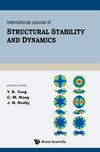Responses of a system comprising a rigid block with resettable sliding key under base excitation
IF 3.4
3区 工程技术
Q2 ENGINEERING, CIVIL
International Journal of Structural Stability and Dynamics
Pub Date : 2023-10-19
DOI:10.1142/s0219455424501499
引用次数: 0
Abstract
The relatively uncontrolled dynamic behavior of a rigid block resting on a flat surface under ground motion has been well studied. In contrast, a block with a gently inclined V- or W-shaped sliding key would ensure dynamic self-centering or resetting performance under various seismic conditions. To better understand the nonlinear responses of rigid blocks having this type of interface where both rocking and sliding movements are possible, an event-based algorithm is put forward to cover various types of motions, including the transition stages between different types of motions. A comprehensive study is carried out to examine the dynamic responses of blocks of different sizes and aspect ratios. Moreover, the simplified pure rocking model and pure sliding model are also adopted to obtain rough estimates of dynamic response for comparison. The results show that the simplified models are reliable for some special cases only, e.g. squat blocks and slender blocks. The study also evaluated the influence of the coefficient of friction and slope inclination on the resetting capabilities of typical sliding-prone and rocking-prone systems. For those cases that are prone to toppling or excessive sliding under strong earthquakes, the provision of vertical post-tensioning can effectively ensure stability and resetting performance. Such findings provide insight into the performance of precast segmental bridge columns with resettable sliding joints.具有可复位滑键的刚性块组成的系统在基础激励下的响应
平地刚性块体在地震动作用下的相对不受控制的动力行为已经得到了很好的研究。相比之下,带有平缓倾斜的V型或w型滑动键的区块将确保在各种地震条件下的动态自定心或重置性能。为了更好地理解具有这种可能发生摇摆和滑动运动的界面的刚性块的非线性响应,提出了一种基于事件的算法来涵盖各种类型的运动,包括不同类型运动之间的过渡阶段。对不同尺寸和纵横比砌块的动态响应进行了综合研究。此外,还采用简化的纯摇摆模型和纯滑动模型来获得动力响应的粗略估计,以便进行比较。结果表明,简化模型仅对一些特殊情况可靠,如深墩和细长墩。研究还评估了摩擦系数和坡度对典型易滑和易摇系统重设能力的影响。对于那些在强震下容易倾倒或过度滑动的情况,提供竖向后张拉可以有效地保证稳定和复位性能。这些发现为具有可复位滑动缝的预制节段桥柱的性能提供了见解。
本文章由计算机程序翻译,如有差异,请以英文原文为准。
求助全文
约1分钟内获得全文
求助全文
来源期刊
CiteScore
5.30
自引率
38.90%
发文量
291
审稿时长
4 months
期刊介绍:
The aim of this journal is to provide a unique forum for the publication and rapid dissemination of original research on stability and dynamics of structures. Papers that deal with conventional land-based structures, aerospace structures, marine structures, as well as biostructures and micro- and nano-structures are considered. Papers devoted to all aspects of structural stability and dynamics (both transient and vibration response), ranging from mathematical formulations, novel methods of solutions, to experimental investigations and practical applications in civil, mechanical, aerospace, marine, bio- and nano-engineering will be published.
The important subjects of structural stability and structural dynamics are placed together in this journal because they share somewhat fundamental elements. In recognition of the considerable research interests and recent proliferation of papers in these subjects, it is hoped that the journal may help bring together papers focused on related subjects, including the state-of-the-art surveys, so as to provide a more effective medium for disseminating the latest developments to researchers and engineers.
This journal features a section for technical notes that allows researchers to publish their initial findings or new ideas more speedily. Discussions of papers and concepts will also be published so that researchers can have a vibrant and timely communication with others.

 求助内容:
求助内容: 应助结果提醒方式:
应助结果提醒方式:


